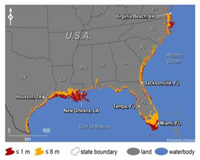| . |  |
. |
Hobart, Australia (SPX) Feb 17, 2011 Marine scientists are trialling the first near-shore water temperature forecasts to assist Australia's aquaculture farm managers contending with rising ocean temperatures. While land farmers have used seasonal forecasting for nearly a decade, marine farmers in south-east Australia have sought the technology for a region identified as a climate change hotspot, with rates of ocean warming up to four times the global average. CSIRO Climate Adaptation Flagship scientist, Dr Alistair Hobday, said the project, funded through the Fisheries Research and Development Corporation, is a response to requests by Tasmania's four major salmon companies for short-term ocean forecasts for their farm sites. "Marine farms in this region, particularly south-east Tasmania, want to use all available resources to ensure proper planning and response measures are in place to combat against the warmer summer months which can have adverse effects on fish performance," Dr Hobday said. "While adaptation to long-term change is seen as important by the sector, dealing with climate variability exacerbated by ongoing climate change is a more immediate need. "Our objective is to provide marine farmers with forecasts at their salmon farming sites up to four months ahead. This will enable management to consider a number of responses that will help maintain industry profitability in an uncertain environment. It should also help this valuable industry to come to terms with long-term climate change and begin formulating adaptation strategies." Valued at $380 million annually, salmon production is Australia's major seafood industry. The trials began in September last year, with forecasts provided to Tasmania's four major salmon farmers each month. Historical data back to 1990 and a seasonal ocean-atmosphere model developed by the Bureau of Meteorology are being used in the predictions. An associated cost-benefit analysis of the predictions applied to each site also will be generated. The project involves trialling advanced statistical techniques to determine how well scientists can resolve the variations at the different time scales. Dr Hobday said warm summers can significantly impact farm production through an increase in operational expenses and direct impacts on salmon, while cool winters slow growth in salmon. He said validation of the forecasts using historical data is improving their accuracy and illustrating the likely benefits to the industry. The work was be detailed in Melbourne during the CCRSPI (National Climate Change Research Strategy for Primary Industries) Conference 2011.
Share This Article With Planet Earth
Related Links CSIRO Marine and Atmospheric Research Climate Adaptation Flagship Water News - Science, Technology and Politics
 Rising Seas Will Affect Major US Coastal Cities By 2100
Rising Seas Will Affect Major US Coastal Cities By 2100Tucson AZ (SPX) Feb 17, 2011 Rising sea levels could threaten an average of 9 percent of the land within 180 U.S. coastal cities by 2100, according to new research led by University of Arizona scientists. The Gulf and southern Atlantic coasts will be particularly hard hit. Miami, New Orleans, Tampa, Fla., and Virginia Beach, Va. could lose more than 10 percent of their land area by 2100. The research is the firs ... read more |
|
| The content herein, unless otherwise known to be public domain, are Copyright 1995-2010 - SpaceDaily. AFP and UPI Wire Stories are copyright Agence France-Presse and United Press International. ESA Portal Reports are copyright European Space Agency. All NASA sourced material is public domain. Additional copyrights may apply in whole or part to other bona fide parties. Advertising does not imply endorsement,agreement or approval of any opinions, statements or information provided by SpaceDaily on any Web page published or hosted by SpaceDaily. Privacy Statement |